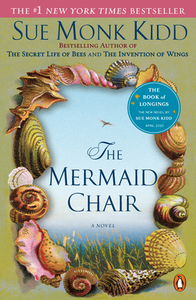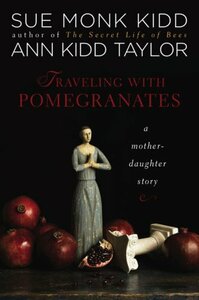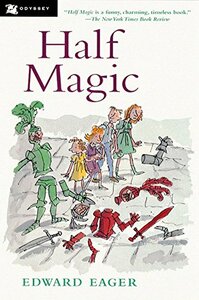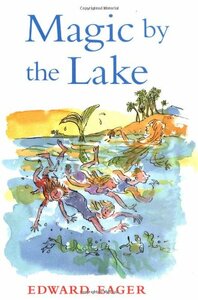Take a photo of a barcode or cover
laurieb755's Reviews (784)
My Mom read this book and then gave it to me. Am writing this in 2015 as I am about to begin Sue Monk Kidd's newest book, The Invention of Wings. The back of that book jacket and author's bio reminded me that I read this book as well as one other, Traveling with Pomegranates.
I remember enjoying this book very much, and am glad to be adding it to my bookshelf.
I remember enjoying this book very much, and am glad to be adding it to my bookshelf.
Hmm. I read this book awhile ago, after reading Kidd's The Mermaid Chair, which I enjoyed quite a bit. This, however, fell short. Parts of it felt contrived. And sometimes it felt like a vehicle to launch Kidd's daughter as an author. I don't begrudge either of them that opportunity; I just wasn't hooked by their collaboration.
Spine tingling in a good way. Amazing story telling. One character feeds into another's story in the next chapter, while the chapters move forward in time from 1786 to 1986 and a bit beyond.
Hoffman has an astonishing imagination and she weaves a tale of time and place, where people are who they are because of where they are and the families they came from. To quote from Hoffman's website:
All these tales take place in a fictitious town called Blackwell, hidden in the Berkshires. I found that particularly intriguing because of six summers (grades 4-9) I spent at a sleep-away camp in Cheshire, MA, which is in the Berkshires. And because just a few days ago my husband suggested we look at Pittsfield, MA (also in the Berkshires) as a possible place to move when we are ready to give up our day jobs.
I devoured this book in two days. Must say something about how I fell into the story and could't get out!
Hoffman has an astonishing imagination and she weaves a tale of time and place, where people are who they are because of where they are and the families they came from. To quote from Hoffman's website:
The Red Garden, published in 2011, is a collection of linked fictions about a small town in Massachusetts where a garden holds the secrets of many lives.
All these tales take place in a fictitious town called Blackwell, hidden in the Berkshires. I found that particularly intriguing because of six summers (grades 4-9) I spent at a sleep-away camp in Cheshire, MA, which is in the Berkshires. And because just a few days ago my husband suggested we look at Pittsfield, MA (also in the Berkshires) as a possible place to move when we are ready to give up our day jobs.
I devoured this book in two days. Must say something about how I fell into the story and could't get out!
Quick read that had me absorbed start to finish. Hoffman may explore fantasy but also the very real many sides of love and friendship. This is my third Hoffman book in a few days (and my fifth in a month), and it's easy to conclude that she has a strong interest in water and the life it holds, as both YA books - this and Aquamarine - harbor mermaids. As well, The Red Garden, completed just yesterday, included homage to sea life.
I found this book on a list compiled by a Librarian for fans of Downton Abbey. Since I do not watch the show, it was the description of this book as a mystery that appealed to me. Well, it is a mystery, and I did read it quickly, but only to find out the conclusion.
The writing and story telling are simply okay. I might even have opted to rate the book a 2 but since I was curious enough to stick with it, a 3 it is.
What makes it "simply okay" - writing that is uninspired and occasionally predictable. Billed on the book cover as "A treat for fans of Downton Abbey. - Deanna Raybourn" it is understandable that the story might be predictable given the likely intended audience. But that is just the problem - it felt like I was reading a book written expressly to sell to those folks who are DA fans, and made me think the author was glomming on to a craze rather than writing a book to stand on its own terms.
The writing and story telling are simply okay. I might even have opted to rate the book a 2 but since I was curious enough to stick with it, a 3 it is.
What makes it "simply okay" - writing that is uninspired and occasionally predictable. Billed on the book cover as "A treat for fans of Downton Abbey. - Deanna Raybourn" it is understandable that the story might be predictable given the likely intended audience. But that is just the problem - it felt like I was reading a book written expressly to sell to those folks who are DA fans, and made me think the author was glomming on to a craze rather than writing a book to stand on its own terms.
I had fun reading this book, and thank a Goodreads author (alas, I have forgotten who!) for mentioning him as having had a heavy influence on her as a child. I plan on reading more of the books in this series.
With that said, I had one issue which can be overcome. I started out reading word for word but then became impatient and skimmed for a bit before returning to word for word. I wasn't impatient for wanting to know the ending; just for feeling like the writing was a little "not quite jelled" for me. But I quite liked the story, so jelled or not I was pleased to stick with it to the end. Of course, it was written for children, and I like books for kids and young adults. I just need to remember this in case I feel similar about the next book in the series.
Oh, and I enjoyed the optimism and quiet lessons and the fact that Eager is the author's last name and this book was published when I was two years old. :-)
With that said, I had one issue which can be overcome. I started out reading word for word but then became impatient and skimmed for a bit before returning to word for word. I wasn't impatient for wanting to know the ending; just for feeling like the writing was a little "not quite jelled" for me. But I quite liked the story, so jelled or not I was pleased to stick with it to the end. Of course, it was written for children, and I like books for kids and young adults. I just need to remember this in case I feel similar about the next book in the series.
Oh, and I enjoyed the optimism and quiet lessons and the fact that Eager is the author's last name and this book was published when I was two years old. :-)
Wait a minute, this is #3? I thought it was the second one in the series and am wondering what I skipped.
Now on to the book!
As with my reading of Half Magic, I wound up not reading verbatim, and again it was less due to my eagerness to see how the story turned out and more that Eager's writing style wore on me a bit. Nonetheless, I understand how his story telling and topic for story telling were an inspiration to the Goodreads author who mentioned him as being such. In particular, Eager wrote about magic by making it an acceptable part of one's reality.
As a child, if I had discovered Eager and his books about magic, I suspect they would have become a favorite series to be devoured alongside chocolate chip cookies and milk.
Finally, perhaps this is a 3.5 instead of a 3.
Now on to the book!
As with my reading of Half Magic, I wound up not reading verbatim, and again it was less due to my eagerness to see how the story turned out and more that Eager's writing style wore on me a bit. Nonetheless, I understand how his story telling and topic for story telling were an inspiration to the Goodreads author who mentioned him as being such. In particular, Eager wrote about magic by making it an acceptable part of one's reality.
As a child, if I had discovered Eager and his books about magic, I suspect they would have become a favorite series to be devoured alongside chocolate chip cookies and milk.
Finally, perhaps this is a 3.5 instead of a 3.
Had I discovered this book as a child, I would have cried "Hazaah - she has read my mind!" E. Nesbit (Edith, actually) crafted a tale so full of a child's imagination and one that would kick start the imagination of any child who had yet to discover just what that word meant. For me, this was the story of childhood, and a telling of a "what if" that I used to wonder about.
I don't know what was more interesting to me as an adult - reading the book or reading the Afterword and learning more about Ellen Nesbit, who signed her books E. Nesbit only to find, with delight, that people presumed she was a man. She had a difficult childhood and difficult first marriage, and perhaps they helped fuel her imagination.
Thank you to Edward Eager, whose books for children I have recently read, for recommending E Nesbit in his writings.
I don't know what was more interesting to me as an adult - reading the book or reading the Afterword and learning more about Ellen Nesbit, who signed her books E. Nesbit only to find, with delight, that people presumed she was a man. She had a difficult childhood and difficult first marriage, and perhaps they helped fuel her imagination.
Thank you to Edward Eager, whose books for children I have recently read, for recommending E Nesbit in his writings.
With minimal interest in the subject, I had to read David McCullough's latest because he is a masterful story teller, and I have enjoyed other books by him. I have also been enchanted by him via a video interview viewed online in three parts several years ago. (Would have linked to the videos but have not had success in finding them again.)
McCullough does not disappoint as he flowingly tells the story of Orville and Wilbur, and their dogged quest to understand how birds fly and how people could fly. I had not realized how young they both were, nor - once they knew their craft and knew they had a viable product - how earnestly they worked to share the idea of humans flying. Further, while it would perhaps seem obvious, it never occurred to me that along with imagining and developing an airplane, they also became highly accomplished pilots.
I enjoyed learning about the Wright's family, especially their father, Bishop Wright, and their sister, Katherine, who provided not just moral support but, particularly during their European stretch, helped organize their lives so they could focus on flight. She was the first American woman to go up in an airplane! Bishop was all for learning, and had no problem with Orville or Wilbur staying home from school to pursue an area of interest that had captivated them. Makes me think of our modern day attempt to do project based learning in school. Orville and Wilbur lived their lives doing project based learning! They did not need a teacher to say "now we are doing PBL."
The Wright Brothers were tinkerers and makers to the nth degree. For those involved in today's maker movement (includes me as a lower school STEAM Integrator), their story makes for especially fascinating reading.
McCullough does not disappoint as he flowingly tells the story of Orville and Wilbur, and their dogged quest to understand how birds fly and how people could fly. I had not realized how young they both were, nor - once they knew their craft and knew they had a viable product - how earnestly they worked to share the idea of humans flying. Further, while it would perhaps seem obvious, it never occurred to me that along with imagining and developing an airplane, they also became highly accomplished pilots.
I enjoyed learning about the Wright's family, especially their father, Bishop Wright, and their sister, Katherine, who provided not just moral support but, particularly during their European stretch, helped organize their lives so they could focus on flight. She was the first American woman to go up in an airplane! Bishop was all for learning, and had no problem with Orville or Wilbur staying home from school to pursue an area of interest that had captivated them. Makes me think of our modern day attempt to do project based learning in school. Orville and Wilbur lived their lives doing project based learning! They did not need a teacher to say "now we are doing PBL."
The Wright Brothers were tinkerers and makers to the nth degree. For those involved in today's maker movement (includes me as a lower school STEAM Integrator), their story makes for especially fascinating reading.
My most excellent book source, a trusty friend and librarian, sent me a book list filled with suggestions sure to engage fans of Downton Abbey. I do not watch the series, but do appreciate a good story, so in I dove and came up with Crossing on the Paris. Would have given it 3.5 stars, but that isn't an option, and going with 4 did not feel true to my experience.
A most enjoyable read for summer, for an airplane flight, and for being on vacation, which are exactly the circumstances of my reading. I liked the tale being told from the perspective of three women, each from a different economic and social station in post-WWI life, who were crossing from Europe to America onboard the Paris. Their lives intersected several times, beginning with their arrival on ship being captured in film for the onboard newsletter.
Their stories were engrossing, if not unsurprising. Dana Gynther's physical descriptions of life on board a ship sounded believable, and her characters seemed feasible, if not predictable. Hence, a comfortable read.
A most enjoyable read for summer, for an airplane flight, and for being on vacation, which are exactly the circumstances of my reading. I liked the tale being told from the perspective of three women, each from a different economic and social station in post-WWI life, who were crossing from Europe to America onboard the Paris. Their lives intersected several times, beginning with their arrival on ship being captured in film for the onboard newsletter.
Their stories were engrossing, if not unsurprising. Dana Gynther's physical descriptions of life on board a ship sounded believable, and her characters seemed feasible, if not predictable. Hence, a comfortable read.









